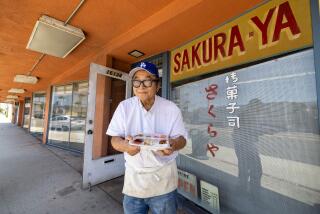Scrapping Over Paper Profits
- Share via
TOKYO — The paper chase starts in the blackness of early morning, a cat-and-mouse game played on Tokyo’s almost empty back streets in the hours before businessmen shake off their hangovers and commuters emerge to flood the city.
Down impossibly narrow lanes, ex-cop Michio Manabe squeezes his patrol car through a west Tokyo neighborhood, his blue light flashing to show he’s on the job. He swivels his head looking for signs of his quarry.
He knows the “apaches” are out there somewhere.
Manabe is on the lookout for recycled-paper thieves, independent collectors who fan out across Japan’s cities in small white flatbed trucks before dawn. In this well-off society they’re often called apaches, a nickname coined in a novel rooted in the scavenging culture of postwar Japan, when those living on the fringe of the law survived on wits and stealth.
Today, their spiritual descendants load up on old newspapers before official city trucks and crews start their rounds, which is why Manabe is on the beat. The former motorcycle cop -- one of the most prestigious postings in the department -- has been hired by one of Tokyo’s local wards to catch apaches at municipal collection points in the act of taking paper, which has unexpectedly become a valuable resource.
“I used to be a Tokyo policeman -- I never imagined I’d be patrolling to protect old newspapers,” Manabe says as he sets up a stakeout across from a waist-high stack of newspapers getting soaked in the morning drizzle.
“But it’s supply and demand, supply and demand,” he says with a knowing shrug. “All because of China.”
The China factor: Spurred by rocketing demand from the Chinese economy, old newspapers and magazines are being collected, crushed into one-ton cubes and exported to Japan’s voracious Asian neighbor in record amounts.
Japan’s city officials never cared much about the small number of apaches operating on the margins back when prices were low and used paper was just a nuisance. But the days of burning old paper or shoving it into a landfill are over.
Two years ago, paper products recorded the biggest price increases among all commodities on the Nikkei index: a 700% leap for used cardboard, followed by a 137% jump for used newspaper.
That demand is largely driven by China’s hunger for cardboard to box and ship goods being produced by its pulsating manufacturing sector. Paper exporters worldwide got a boost after China lifted its tariffs on forest products with its entry in the World Trade Organization in 2001.
As a result, Japan exported almost 83 times as much recycled paper last year as it did four years ago. And more than half now goes to China -- which in 1999 took in a mere 4% of Japanese paper exports.
“A nonvaluable item has become valuable,” says Yuji Tanamachi, an analyst at Metal Recycling Japan, a daily market journal on the recycling industry. “Without China, the current market wouldn’t last.”
The demand of a billion or so Chinese consumers can drive up global prices on oil, platinum or just about anything else. But the scramble for used paper shows the pervasiveness of this economic revolution, how the ripples even reach street-level scavenging.
The soaring demand for paper has triggered fierce competition between local governments and the rapidly swelling ranks of apaches for the raw material.
Appalled by the daily free-for-all on their streets, some wards have threatened the freelancers with fines of up to $2,000 and even arrested apaches in some cases -- though prosecutors have so far turned up their noses at taking a case to court.
And in a pilot project, Tokyo’s Suginami ward has hired extra security to shoo the apaches away.
Sure enough, on this rainy weekday morning, Manabe spots an intruder on his patch.
“There he is!” he says, leaning forward and putting the car into gear after spotting a telltale white truck in his rearview mirror. After negotiating some tight turns -- “It’s almost impossible to catch anyone on these streets,” he complains -- Manabe slams on his brakes behind a man loading newspapers into the back of a truck already bursting with them.
Like many apaches, the man doing the pilfering is not young. He is 65, and he tells Manabe he goes out at 4 every morning looking for paper, despite a bad heart condition.
“This job is the same as being a beggar,” he complains, sitting restlessly in his truck as Manabe records his name and gives him a warning.
Manabe then makes the man put two incriminating bundles back on the street. The driver can keep the rest.
“They know the loopholes in the law,” Manabe says. Legally, Manabe can only confiscate what he sees being “stolen.”
It’s not stolen, argues Masamitsu Matsuzawa, the founder and president of Matsuzawa Paper Co. in Tokyo’s Adachi ward and a businessman who has been buying paper from a network of freelancers for nearly 40 years.
“Once the original owner releases it, it belongs to nobody. But since prices went up, the local authority is trying to take control of the paper,” he said.
Some industry observers suggest that Matsuzawa may be the godfather of the apaches. He has a fleet of 137 trucks that he rents out to independent drivers for about $15 a day, gas not included.
If a driver can fill the truck, he stands to earn almost $120. But with so many drivers chasing a limited number of papers, Matsuzawa says most take home less than $50 a day, which doesn’t go far in Tokyo. Some of the drivers live in trailers parked on Matsuzawa’s lot.
Matsuzawa, though, is prospering as the number of drivers crowding into his east Tokyo factory every day expands.
Ward officials deny they are trying to monopolize paper collection. In fact, the overall recycling scheme in the Suginami ward operated at a loss last year, officials say, in part because of the competition from apaches. Critics counter that the wards, with their bloated payrolls, are just inefficient.
“Our intention is not to make money by collecting and selling the stuff,” says Madoka Shiohata from the Recycle Promotion Division of the Suginami ward office. “But we were hearing complaints from residents that some of the outsiders had bad attitudes and were a bit scary. Some of them shout at residents and intimidate them. They could at least introduce themselves politely and get permission to take the paper.”
Matsuzawa rejects the apache label for the dozens of men who hunt down the papers and allow his plant to run seven days a week. It is a derogatory term, he says, pointing to a poster on the factory wall that urges his collectors to be polite in dealing with citizens. Matsuzawa prefers to call his men nukitori, which roughly means “cherry-pickers.”
The “apache” nickname comes from the 1971 novel “Japan’s Threepenny Opera,” based on the real experiences of a group of homeless men, dropouts, war vets and petty criminals living in Osaka in the aftermath of World War II. They saw themselves as outlaws and organized a gang that made money by sneaking onto an old Imperial Army plant to scavenge for scrap metal from idled cannons and tanks.
Author Takeshi Kaiko described them as “nimble, rough and militant” and named them apaches after the Native American tribe.
But Minoru Nagano won’t let anyone call him an apache. He is a professional in this business, he says, waving a pair of box cutters for emphasis.
Oh, apaches exist, he says. They’re the opportunists, who entered only when Chinese demand made the paper recycling business take off.
“But people appreciate what I do,” Nagano says, standing atop a slippery mound of glossy magazine paper.
“I’m not picky, so I collect even when the volume is very small. I collect from old women and disabled people at their homes. I collect from police stations. They say, ‘Good morning,’ and thank me for taking their paper.
“But I am still treated with contempt and arrogance by the ward authorities.”
Nagano has been collecting used paper for 10 years, since he lost his job driving heavy equipment for a construction company at age 47.
When Japan’s economic bubble burst, tens of thousands of middle-aged Japanese men had to deal with being unemployed for the first time in a society that once boasted a covenant of jobs for life.
Nearby, Takashi Matsumoto was taking a break from unloading his van. He lost his management job at a large aluminum company a few years ago and turned to collecting paper when he couldn’t find other work.
And now that business is booming, the government is trying to shut down his enterprise, he complains.
“We are middle-aged people who find it very, very difficult to find a job,” says Matsumoto, 52. “This is the last option for us, and the local authorities are trying to squeeze us out of business.”
Many experts argue that local governments should let the independent operators do the collecting.
“This business is providing jobs to homeless people,” says Kazuki Kumamoto, a professor at Meiji Gakuin University in Tokyo. “The authorities should leave it alone as long as it creates some profits. All they are doing now is spending tax money to recycle paper.”
Even Manabe, the enforcer, shows a soft spot for the men he chases daily through the inner-city maze.
“As a human being, I have sympathy for these guys,” he says. “They are working to live, so I feel for them.
“It’s a pity, a pity,” he says after the driver he warned has moved on, resuming his part in the morning scramble. “They all could be thrown out on the street tomorrow if things change in China.
“You never know how China will do,” he says. “Who knows how long this will continue?”
Hisako Ueno of The Times’ Tokyo Bureau contributed to this report.
More to Read
Inside the business of entertainment
The Wide Shot brings you news, analysis and insights on everything from streaming wars to production — and what it all means for the future.
You may occasionally receive promotional content from the Los Angeles Times.










